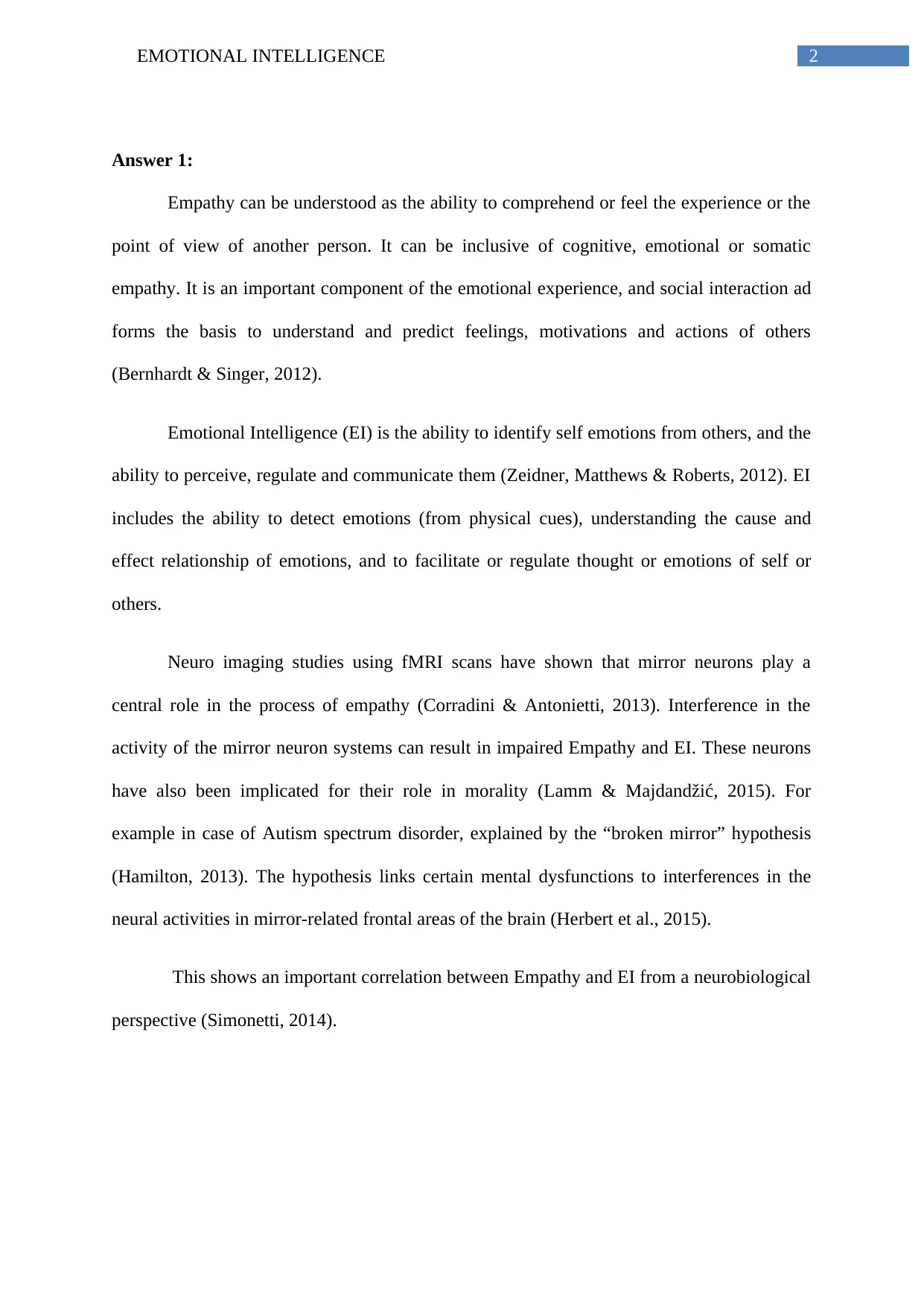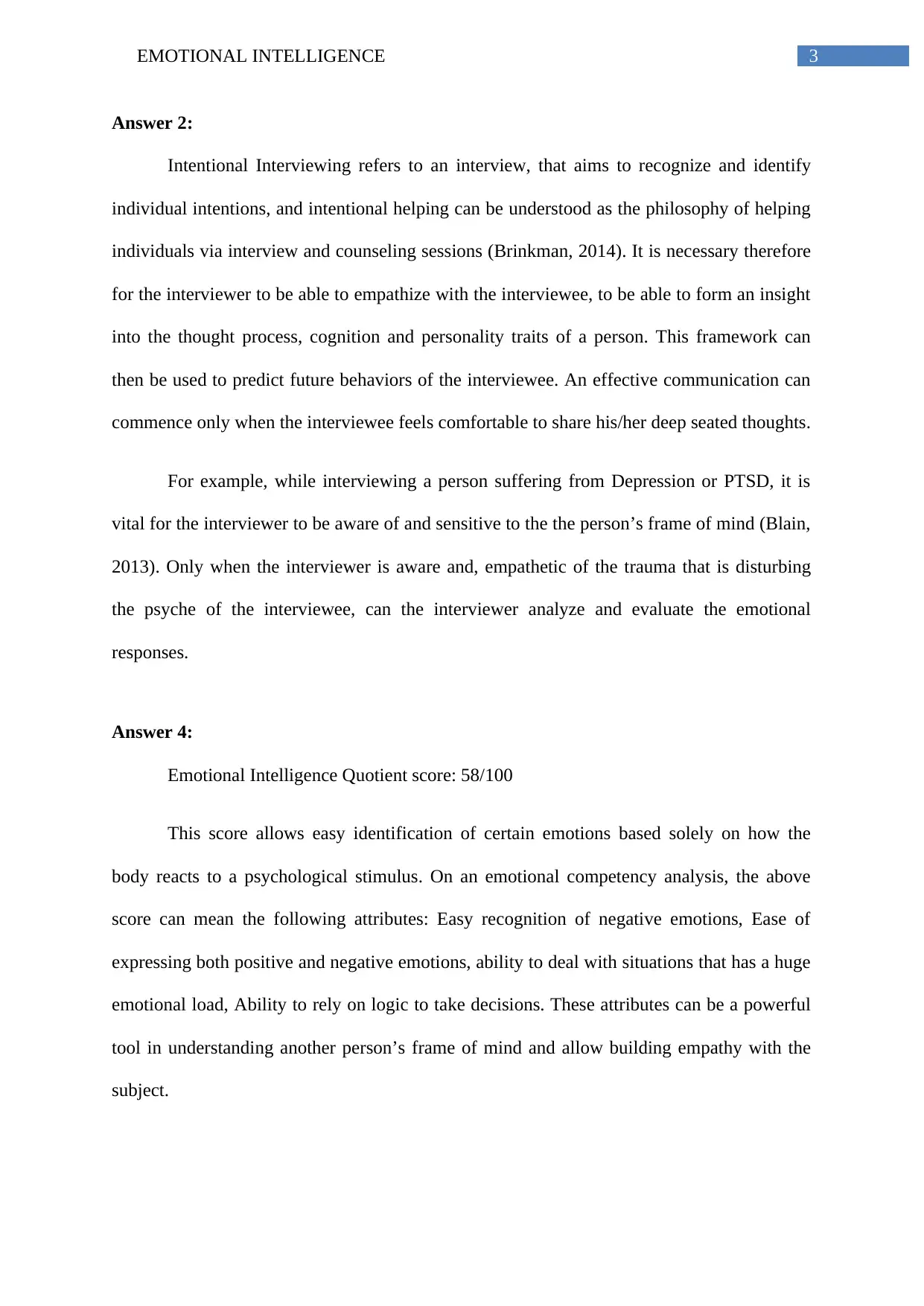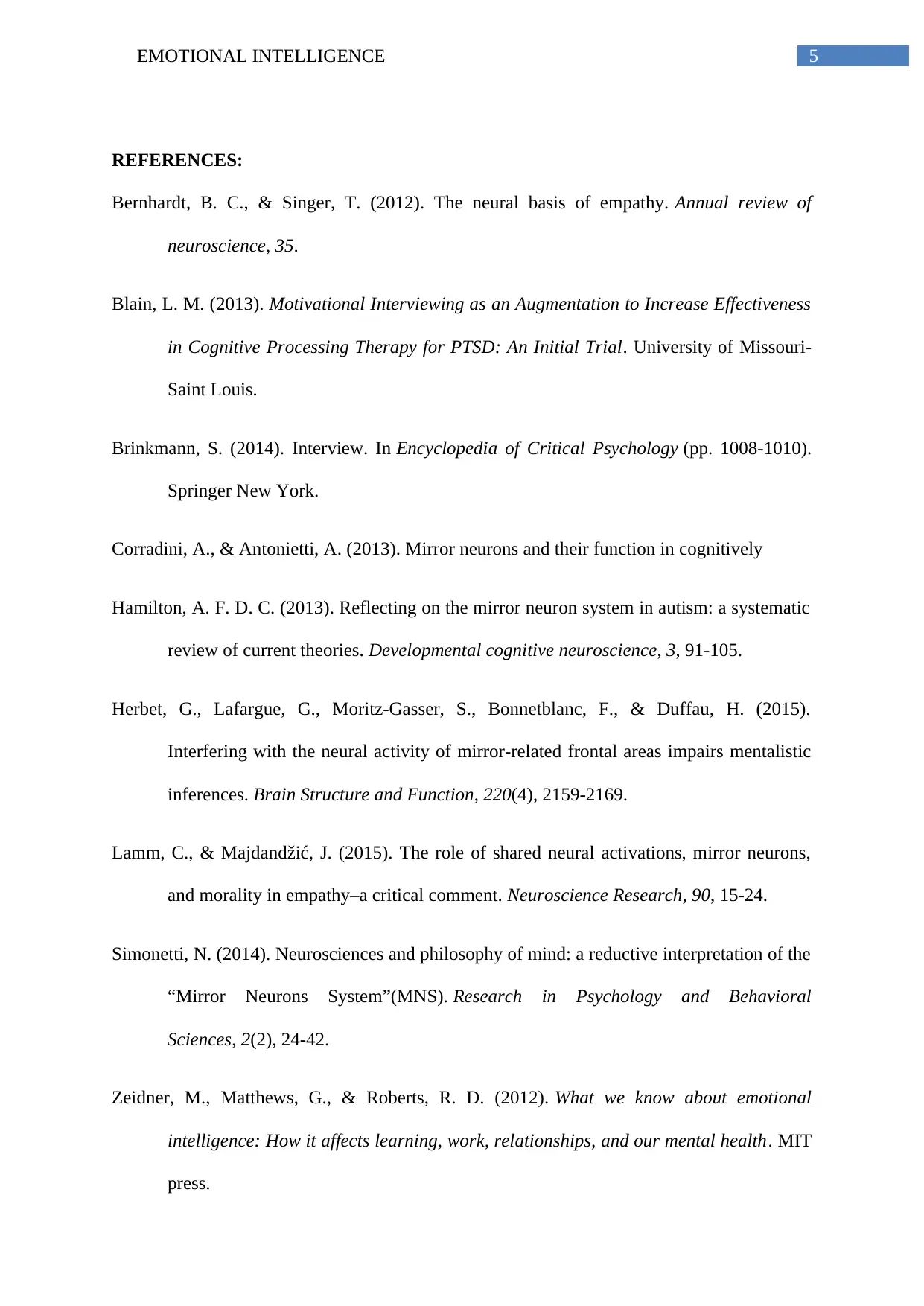Analysis of Emotional Intelligence and Its Applications
VerifiedAdded on 2020/05/11
|6
|1008
|134
Homework Assignment
AI Summary
This assignment delves into the multifaceted concept of emotional intelligence (EI) and its significance within the field of psychology. It explores the definition of empathy, encompassing cognitive, emotional, and somatic aspects, and highlights its importance in social interactions and understanding others' behaviors. The assignment discusses the neurobiological underpinnings of empathy, particularly the role of mirror neurons and their implications in conditions like autism spectrum disorder. Furthermore, it examines intentional interviewing as a tool for understanding individual intentions and facilitating effective communication, especially in sensitive contexts such as interviews with individuals suffering from depression or PTSD. The assignment also includes an emotional intelligence quotient score and its attributes, emphasizing the importance of developing skills such as self-awareness and the ability to differentiate between cognitive and affective empathy. The document concludes with a list of references supporting the key concepts discussed.

Running head: EMOTIONAL INTELLIGENCE
EMOTIONAL INTELLIGENCE
Name of the Student
Name of the University
Author note
EMOTIONAL INTELLIGENCE
Name of the Student
Name of the University
Author note
Paraphrase This Document
Need a fresh take? Get an instant paraphrase of this document with our AI Paraphraser

1EMOTIONAL INTELLIGENCE
Table of Contents
Answer 1....................................................................................................................................2
Answer 2....................................................................................................................................2
Answer 4:...................................................................................................................................3
REFERENCES:..........................................................................................................................5
Table of Contents
Answer 1....................................................................................................................................2
Answer 2....................................................................................................................................2
Answer 4:...................................................................................................................................3
REFERENCES:..........................................................................................................................5

2EMOTIONAL INTELLIGENCE
Answer 1:
Empathy can be understood as the ability to comprehend or feel the experience or the
point of view of another person. It can be inclusive of cognitive, emotional or somatic
empathy. It is an important component of the emotional experience, and social interaction ad
forms the basis to understand and predict feelings, motivations and actions of others
(Bernhardt & Singer, 2012).
Emotional Intelligence (EI) is the ability to identify self emotions from others, and the
ability to perceive, regulate and communicate them (Zeidner, Matthews & Roberts, 2012). EI
includes the ability to detect emotions (from physical cues), understanding the cause and
effect relationship of emotions, and to facilitate or regulate thought or emotions of self or
others.
Neuro imaging studies using fMRI scans have shown that mirror neurons play a
central role in the process of empathy (Corradini & Antonietti, 2013). Interference in the
activity of the mirror neuron systems can result in impaired Empathy and EI. These neurons
have also been implicated for their role in morality (Lamm & Majdandžić, 2015). For
example in case of Autism spectrum disorder, explained by the “broken mirror” hypothesis
(Hamilton, 2013). The hypothesis links certain mental dysfunctions to interferences in the
neural activities in mirror-related frontal areas of the brain (Herbert et al., 2015).
This shows an important correlation between Empathy and EI from a neurobiological
perspective (Simonetti, 2014).
Answer 1:
Empathy can be understood as the ability to comprehend or feel the experience or the
point of view of another person. It can be inclusive of cognitive, emotional or somatic
empathy. It is an important component of the emotional experience, and social interaction ad
forms the basis to understand and predict feelings, motivations and actions of others
(Bernhardt & Singer, 2012).
Emotional Intelligence (EI) is the ability to identify self emotions from others, and the
ability to perceive, regulate and communicate them (Zeidner, Matthews & Roberts, 2012). EI
includes the ability to detect emotions (from physical cues), understanding the cause and
effect relationship of emotions, and to facilitate or regulate thought or emotions of self or
others.
Neuro imaging studies using fMRI scans have shown that mirror neurons play a
central role in the process of empathy (Corradini & Antonietti, 2013). Interference in the
activity of the mirror neuron systems can result in impaired Empathy and EI. These neurons
have also been implicated for their role in morality (Lamm & Majdandžić, 2015). For
example in case of Autism spectrum disorder, explained by the “broken mirror” hypothesis
(Hamilton, 2013). The hypothesis links certain mental dysfunctions to interferences in the
neural activities in mirror-related frontal areas of the brain (Herbert et al., 2015).
This shows an important correlation between Empathy and EI from a neurobiological
perspective (Simonetti, 2014).
⊘ This is a preview!⊘
Do you want full access?
Subscribe today to unlock all pages.

Trusted by 1+ million students worldwide

3EMOTIONAL INTELLIGENCE
Answer 2:
Intentional Interviewing refers to an interview, that aims to recognize and identify
individual intentions, and intentional helping can be understood as the philosophy of helping
individuals via interview and counseling sessions (Brinkman, 2014). It is necessary therefore
for the interviewer to be able to empathize with the interviewee, to be able to form an insight
into the thought process, cognition and personality traits of a person. This framework can
then be used to predict future behaviors of the interviewee. An effective communication can
commence only when the interviewee feels comfortable to share his/her deep seated thoughts.
For example, while interviewing a person suffering from Depression or PTSD, it is
vital for the interviewer to be aware of and sensitive to the the person’s frame of mind (Blain,
2013). Only when the interviewer is aware and, empathetic of the trauma that is disturbing
the psyche of the interviewee, can the interviewer analyze and evaluate the emotional
responses.
Answer 4:
Emotional Intelligence Quotient score: 58/100
This score allows easy identification of certain emotions based solely on how the
body reacts to a psychological stimulus. On an emotional competency analysis, the above
score can mean the following attributes: Easy recognition of negative emotions, Ease of
expressing both positive and negative emotions, ability to deal with situations that has a huge
emotional load, Ability to rely on logic to take decisions. These attributes can be a powerful
tool in understanding another person’s frame of mind and allow building empathy with the
subject.
Answer 2:
Intentional Interviewing refers to an interview, that aims to recognize and identify
individual intentions, and intentional helping can be understood as the philosophy of helping
individuals via interview and counseling sessions (Brinkman, 2014). It is necessary therefore
for the interviewer to be able to empathize with the interviewee, to be able to form an insight
into the thought process, cognition and personality traits of a person. This framework can
then be used to predict future behaviors of the interviewee. An effective communication can
commence only when the interviewee feels comfortable to share his/her deep seated thoughts.
For example, while interviewing a person suffering from Depression or PTSD, it is
vital for the interviewer to be aware of and sensitive to the the person’s frame of mind (Blain,
2013). Only when the interviewer is aware and, empathetic of the trauma that is disturbing
the psyche of the interviewee, can the interviewer analyze and evaluate the emotional
responses.
Answer 4:
Emotional Intelligence Quotient score: 58/100
This score allows easy identification of certain emotions based solely on how the
body reacts to a psychological stimulus. On an emotional competency analysis, the above
score can mean the following attributes: Easy recognition of negative emotions, Ease of
expressing both positive and negative emotions, ability to deal with situations that has a huge
emotional load, Ability to rely on logic to take decisions. These attributes can be a powerful
tool in understanding another person’s frame of mind and allow building empathy with the
subject.
Paraphrase This Document
Need a fresh take? Get an instant paraphrase of this document with our AI Paraphraser

4EMOTIONAL INTELLIGENCE
To be able to continue work in the field of psychology, it is also important to develop
the following skill sets: Ability to dig deeper into emotions to understand their source and
cause, Becoming self aware to reflect on emotions properly, Ability to step back and analyze
an overwhelming situation. Also, it is vital to be able to discern between cognitive and
effective empathy. Incorporating these attributes would require a greater level of
introspection on the emotion-behavior relationship for both self and others, which in turn
improve the ability to truly empathize with others.
To be able to continue work in the field of psychology, it is also important to develop
the following skill sets: Ability to dig deeper into emotions to understand their source and
cause, Becoming self aware to reflect on emotions properly, Ability to step back and analyze
an overwhelming situation. Also, it is vital to be able to discern between cognitive and
effective empathy. Incorporating these attributes would require a greater level of
introspection on the emotion-behavior relationship for both self and others, which in turn
improve the ability to truly empathize with others.

5EMOTIONAL INTELLIGENCE
REFERENCES:
Bernhardt, B. C., & Singer, T. (2012). The neural basis of empathy. Annual review of
neuroscience, 35.
Blain, L. M. (2013). Motivational Interviewing as an Augmentation to Increase Effectiveness
in Cognitive Processing Therapy for PTSD: An Initial Trial. University of Missouri-
Saint Louis.
Brinkmann, S. (2014). Interview. In Encyclopedia of Critical Psychology (pp. 1008-1010).
Springer New York.
Corradini, A., & Antonietti, A. (2013). Mirror neurons and their function in cognitively
Hamilton, A. F. D. C. (2013). Reflecting on the mirror neuron system in autism: a systematic
review of current theories. Developmental cognitive neuroscience, 3, 91-105.
Herbet, G., Lafargue, G., Moritz-Gasser, S., Bonnetblanc, F., & Duffau, H. (2015).
Interfering with the neural activity of mirror-related frontal areas impairs mentalistic
inferences. Brain Structure and Function, 220(4), 2159-2169.
Lamm, C., & Majdandžić, J. (2015). The role of shared neural activations, mirror neurons,
and morality in empathy–a critical comment. Neuroscience Research, 90, 15-24.
Simonetti, N. (2014). Neurosciences and philosophy of mind: a reductive interpretation of the
“Mirror Neurons System”(MNS). Research in Psychology and Behavioral
Sciences, 2(2), 24-42.
Zeidner, M., Matthews, G., & Roberts, R. D. (2012). What we know about emotional
intelligence: How it affects learning, work, relationships, and our mental health. MIT
press.
REFERENCES:
Bernhardt, B. C., & Singer, T. (2012). The neural basis of empathy. Annual review of
neuroscience, 35.
Blain, L. M. (2013). Motivational Interviewing as an Augmentation to Increase Effectiveness
in Cognitive Processing Therapy for PTSD: An Initial Trial. University of Missouri-
Saint Louis.
Brinkmann, S. (2014). Interview. In Encyclopedia of Critical Psychology (pp. 1008-1010).
Springer New York.
Corradini, A., & Antonietti, A. (2013). Mirror neurons and their function in cognitively
Hamilton, A. F. D. C. (2013). Reflecting on the mirror neuron system in autism: a systematic
review of current theories. Developmental cognitive neuroscience, 3, 91-105.
Herbet, G., Lafargue, G., Moritz-Gasser, S., Bonnetblanc, F., & Duffau, H. (2015).
Interfering with the neural activity of mirror-related frontal areas impairs mentalistic
inferences. Brain Structure and Function, 220(4), 2159-2169.
Lamm, C., & Majdandžić, J. (2015). The role of shared neural activations, mirror neurons,
and morality in empathy–a critical comment. Neuroscience Research, 90, 15-24.
Simonetti, N. (2014). Neurosciences and philosophy of mind: a reductive interpretation of the
“Mirror Neurons System”(MNS). Research in Psychology and Behavioral
Sciences, 2(2), 24-42.
Zeidner, M., Matthews, G., & Roberts, R. D. (2012). What we know about emotional
intelligence: How it affects learning, work, relationships, and our mental health. MIT
press.
⊘ This is a preview!⊘
Do you want full access?
Subscribe today to unlock all pages.

Trusted by 1+ million students worldwide
1 out of 6
Related Documents
Your All-in-One AI-Powered Toolkit for Academic Success.
+13062052269
info@desklib.com
Available 24*7 on WhatsApp / Email
![[object Object]](/_next/static/media/star-bottom.7253800d.svg)
Unlock your academic potential
Copyright © 2020–2026 A2Z Services. All Rights Reserved. Developed and managed by ZUCOL.





